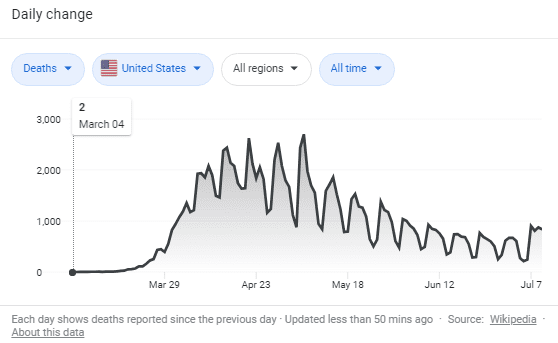It is surprising to see the level of innumeracy in the population, even in college-educated professionals. People still have blind faith in so-called experts and journalists, many experts being innumerate themselves when it comes to reading and interpreting data, even if they are experts in their own field. Here I discuss three examples.

Source: here
Fallacy #1
US is the worst country. Well, Belgium is more than 2 times worse with 10,000 deaths out of 10 million inhabitants. It would translate to 300,000 deaths in US, but we are at 130,000. I have no doubt US will catch up and hopefully Belgium is mostly over it. But at this moment, US is not worse than many other countries. It just delayed the inevitable spike.
Fallacy #2
In US, so far, we have 136,000 out of 3.2 million positives. This put the death rate at 4.25%. But the vast majority of those who are or were once positives (including my whole family) were never tested. So the actual number is not 3.2 million, but probably above 20 million (see here), putting the death rate at 0.68%. Also see my previous article here. The huge increase in new positive cases, associated with a modest increase in deaths, is a testament that far more people are being tested now, people who would not have been tested 4 months ago. With 80% of the infected not requiring medical help, we still have a huge proportion of positive people not getting tested, not needing any medical care. Not everyone (and maybe less than 50%) who recovered still have antibodies after 4 months, also skewing results based on antibody tests alone.
Fallacy #3
Even some data scientists claim that I was very lucky to have recovered, and that I may get re-infected again. No, I was not lucky by any mean. Based on my estimates, and not having severe health conditions, it was perfectly expected (with a probability of 99.8%) that I would recover. It was also expected with a probability of (99.8%)^4 = 99.2%, that all the four members of my family would recover or get no symptom / no infection. My case was 2+ months long, yet mild. Difficulty breathing (one of the many symptoms) was similar to that caused by wearing a mask or breathing smokey air after a big wild fire. Yet so many people think it is black or white: you either get almost nothing, or you get a terrible experience with long-term damage or death. Yet, I don’t belong to any of these categories, and my case is likely to be typical if you are among those having symptoms for 2+ months, and no severe health condition. But cases like mine are never featured in the news, especially since it did not even require a visit to the doctor. Recovery is full. And it makes perfect sense. For instance if you look at car accidents, the number breakdown (percentage-wise) between those who die, those with permanent damage, those with a 3-month problem who eventually fully recover, those with little issues, and those unhurt, is likely to be similar.
Many also claim that you only get a few weeks of immunity once recovered. This is not based on any data. The only case I know well is mine (thus anecdotal, but one of the few that is 4-month old) and I haven’t caught the virus a second time (none of my family did), or if I did, it was so mild I did not even notice. True, it is more difficult now to get re-infected even if you try hard. But most likely, many people will get between 6 months to many years of immunity. We’ll see in a year if my predictions are correct. And if immunity lasts only for 3 weeks for most people, no vaccine will ever work.
